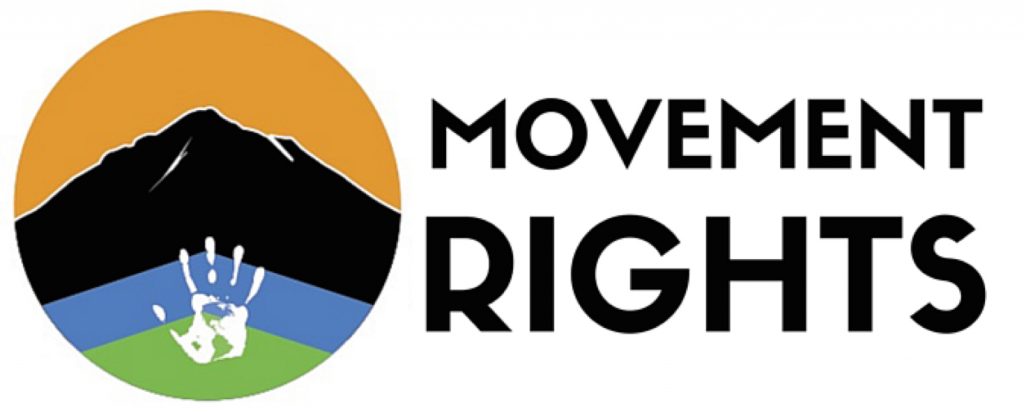MEDIA ADVISORY
November 15, 2022
USA Press Contact:
Shannon Biggs, Director, Movement Rights, shannon@movementrights.org +1 (415) 942-2434
Egypt/COP 27 Press Contacts: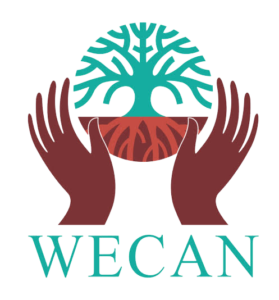
Osprey Orielle Lake, Director, Women’s Earth & Climate Action Network (WECAN), osprey@wecaninternational.org
Report Reveals Bold Climate Solutions and Weakness of UN COP Process
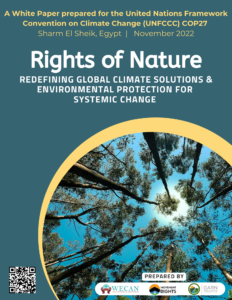 (Sharm El Sheik, Egypt) – As UN Chief António Guterres dramatically warned leaders on Day One of the COP 27 climate negotiations, the world is on the “highway to climate hell.” And while the consequences of the already crumbling talks in Egypt could not be more dire, Rights of Nature advocates held a press conference today at the UN Climate Summit to share a new white paper, “Rights of Nature: Redefining Global Climate Solutions & Environmental Protection for Systemic Change.” The report points out the fundamental problem may lie within the framework of the UNFCCC process itself. Instead, they point to the progress being made by the fast growing global movement for the Rights of Nature, now law in over 20 countries worldwide.
(Sharm El Sheik, Egypt) – As UN Chief António Guterres dramatically warned leaders on Day One of the COP 27 climate negotiations, the world is on the “highway to climate hell.” And while the consequences of the already crumbling talks in Egypt could not be more dire, Rights of Nature advocates held a press conference today at the UN Climate Summit to share a new white paper, “Rights of Nature: Redefining Global Climate Solutions & Environmental Protection for Systemic Change.” The report points out the fundamental problem may lie within the framework of the UNFCCC process itself. Instead, they point to the progress being made by the fast growing global movement for the Rights of Nature, now law in over 20 countries worldwide.
The press conference (watch recording here) included speakers Casey Camp Horinek, Ponca Environmental Ambassador and Movement Rights‘ board member; Osprey Orielle Lake, Executive Director of Women’s Earth and Climate Action Network (WECAN); and Nnimmo Bassey, prominent Nigerian environmental activist and director of the ecological think tank Health of Mother Earth Foundation (HOMEF). All are also members of the Global Alliance for the Rights of Nature (GARN).
The white paper points to the predictable failure of the International Community to significantly address climate change, “UNFCCC efforts have failed to stop the acceleration of climate chaos and mass extinction primarily because they are not rooted in the economics of the biosphere—the actual carrying capacity of Earth. This flawed thinking is embedded in the DNA of trade deals, environmental policies and treaties around the world—including the COP 21 Paris Agreement.”
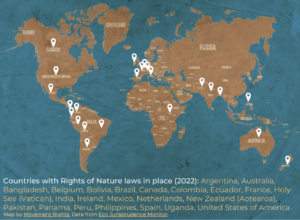 Meanwhile recognizing legal Rights of Nature, with its roots in Indigenous traditional knowledge, has become a fast moving global phenomenon, gaining strength in new countries every few weeks. As of November 2022, more than 20 countries have recognized legal rights for ecosystems to thrive, and regenerate their natural capacities, while holding polluters responsible for the damage they cause. The white paper illustrates that even the weak agreements forged during UN climate negotiations are not legally binding, while Rights of Nature offers legally enforceable protections for ecosystem protection that can curb fossil fuel production and other climate change accelerators while empowering just economy transition strategies.
Meanwhile recognizing legal Rights of Nature, with its roots in Indigenous traditional knowledge, has become a fast moving global phenomenon, gaining strength in new countries every few weeks. As of November 2022, more than 20 countries have recognized legal rights for ecosystems to thrive, and regenerate their natural capacities, while holding polluters responsible for the damage they cause. The white paper illustrates that even the weak agreements forged during UN climate negotiations are not legally binding, while Rights of Nature offers legally enforceable protections for ecosystem protection that can curb fossil fuel production and other climate change accelerators while empowering just economy transition strategies.
In just over a decade, Rights of Nature (or Rights of Mother Earth and other terminology) has quietly been flourishing. It defines legal, enforceable rights for ecosystems to exist, flourish, and regenerate their natural capacities. Recognizing these rights places obligations on humans to live within, rather than as owners of, the natural world, and to protect and replenish the ecosystems upon which our mutual well-being depends. When implemented, these laws have been used to stop fossil fuel extraction, mining, dams, and other harmful development projects that will ensure we cannot meet targets to stop the worst impacts of catastrophic climate change and mass extinction. To showcase the power and potential of the Rights of Nature, the white paper outlines what has been accomplished in just the last two years as more and more nations consider a rights-based approach to environmental protection.
PRESS CONFERENCE SPEAKER QUOTES:
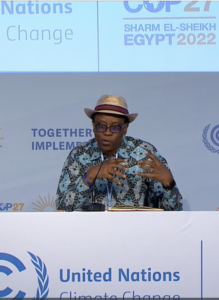 Nnimmo Bassey, Global Alliance for the Rights of Nature:
Nnimmo Bassey, Global Alliance for the Rights of Nature:
- In 2010, in Cochabamba, Bolivia the [Universal Declaration on the Rights of Mother Earth] was adopted by the global community in just over 2 days. The difference at the Conference of Parties—or Conference of Polluters, every year it is a [convening] to avoid action.
- This year, “loss and damage” has been pushed forward to the next COP to solve. We cannot solve climate crisis that way. We must be accountable for harms we inflict on our Mother. And yet, the COP says we can talk about this in the future. If the COP does not want to discuss loss and damage, the COP itself is broken. We have to start planning to have ‘counter COPs’, not performative rituals.
- Climate crisis is a crisis of care, where humans have ignored our Mother Earth. To return to sanity, we have to recognize that we must care for our home. The Earth is our home, our mother, our everything. We are not higher than any other species. If we kill the bees, we live for just a few months.
- There is an African proverb that says, if a child burns down our father’s house, they inherit the ashes. If we disrupt the cycles of nature and destroy our home, what we’re aiming for is ashes.
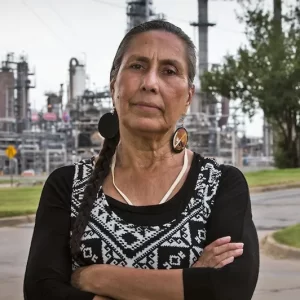 Casey Camp Horinek, Movement Rights:
Casey Camp Horinek, Movement Rights:
-
[As Native Americans] We’ve been forced off of our own lands, for the Ponca and 36 other tribes the Trail of Tears moved us to the “Indian territory” in Oklahoma. We were told we must model our nations after their [US] failing government and law. They have the right to break every treaty, the right to continue Indigenous genocide—starting with Smallpox blankets. Fast forward to today the environmental genocide continues by oil companies like Conoco Phillips, fracking, injection wells, [fossil fuel] man camps that come through our territories—defiling the Earth by putting chemicals into the land, air and water.
-
The Ponca decided to reestablish our own sovereign laws, first in 2017, becoming the first tribe [in the US] to recognize Rights of Nature. And in July 2022 we recognized the Rights of two sacred rivers that surround us because fracking waste is being dumped in there, fish kills are happening. Rights is not something we’re GIVING to Nature, we’re recognizing the rights that always have been always will be.
-
The Earth will be here when we’re gone. But we can chose a different path. Do we, as humans, like Movement Rights says, chose to align human law with the laws of the natural world? When those things come together then we have a way forward. I hear a lot about Human Rights and Indigenous Rights at the COP. What are we if we’re not Nature herself? It is about the Rights of Nature and our human responsibilities to her. We can do this. We can do this.
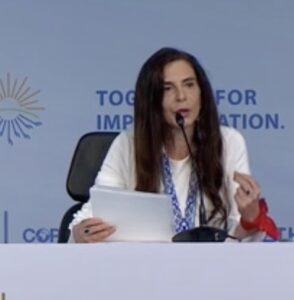 Osprey Orielle Lake, Women’s Earth and Climate Action Network:
Osprey Orielle Lake, Women’s Earth and Climate Action Network:
- The global Rights of Nature movement is looking for revolutionary and evolutionary change for society. At the heart of it we’re asking, “How can we transform our laws and neoliberal economic systems that are literally destroying people and planet?”
- Much of the vision and worldview of Rights of Nature frameworks come from Indigenous Peoples around the world and their knowledge of the natural laws of Mother Earth. We have a lot to learn from their Original Instructions.
- With some successes, our modern legal systems have failed to prevent the increasing grave threats of global warming, degradation of the sacred systems of life and death of species. To truly live in harmony with Mother Earth, we have to change the DNA of our legal frameworks. Today the majority of laws treats nature as property. Life-giving forests, rivers are nature in property. We have to ask, why do we allow the lethal —and legal—destruction of nature?
- As climate disruption and environmental degradation increases it could not be more important to highlight that exploitation and extractivism is the result of patriarchal societies, colonization, racism, and Neo-liberal capitalism. All are based on ideologies of human power over nature, women, Indigenous peoples, people of color and the land.
- The global community needs to address these systems of oppression in an intersectional manner. To move toward justice, and real solutions. Rights of Nature can offer a vital path toward this effort. We cannot keep taking and taking or quite simply we will not survive. Let’s change our laws to live in harmony with life.
###
